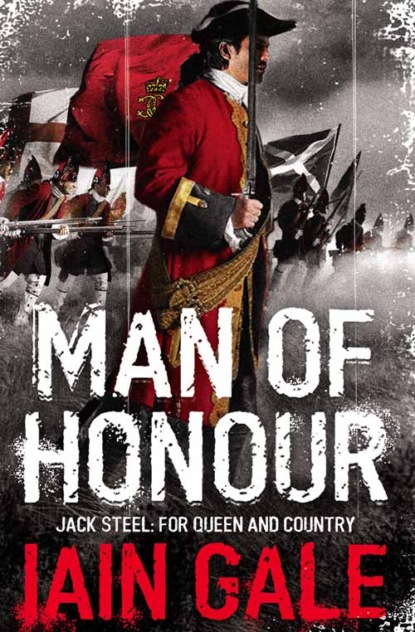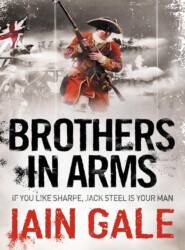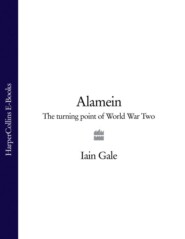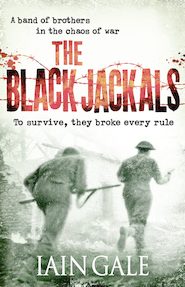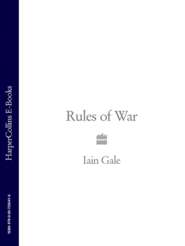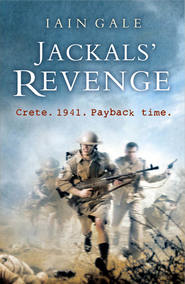По всем вопросам обращайтесь на: info@litportal.ru
(©) 2003-2024.
✖
Jack Steel Adventure Series Books 1-3: Man of Honour, Rules of War, Brothers in Arms
Автор
Год написания книги
2018
Настройки чтения
Размер шрифта
Высота строк
Поля
‘You will recall our conversation on the matter of Captain Stapleton’s gold and the fact that I was to pay Herr Kretzmer to procure the papers?’
‘Sir.’
‘There has been a change of plan.’
Stringer’s weasel eyes narrowed.
‘As Mister Steel contrived to speak to Herr Kretzmer before us, it would appear that he has taken the papers for himself and thus we can no longer buy them from that gentleman. In short Herr Kretzmer is no longer of any use. Lieutenant Steel, on the other hand, is vital to our plans. And here is the rub. If you are with me in this, Stringer, which I perceive from your expression you are, we must contrive some means of relieving Mister Steel of those papers. The gold of course now belongs to me. Or rather us. For if we return to Major Stapleton with the documents he will expect the gold to be forfeit. And who will say that we did not pay Herr Kretzmer?’ Stringer furrowed his brow in thought.
‘Mister Steel, Sir?’
‘Mister Steel, Stringer. Our only problem is Mister Steel. What would you say we should do to solve that problem, Stringer?’
The Sergeant thought again and then, as the solution came to him drew close to Jennings’ ear:
‘Kill him, Sir. Settle him for good.’
‘Yes, Stringer, I do think for once, that you may be right.’
SIX (#ulink_93475403-cfd6-50ed-882f-a87ec985b8cb)
Steel eased himself forward in the saddle and shifted position. Damn this leather. Surely, he should have learnt by now that anything bought as a bargain on campaign would quickly prove to be an utter waste of what little money he had. He moved again, carefully, lest the men should notice. There was a particular piece of the hard hide, just below the cantle, that kept on digging into his thigh and chafing the skin. He swore quietly and turned to the rider on his right. They sat at the head of the great column that wound for more than half a mile behind them through the sun-dappled Bavarian countryside.
‘You know, Tom, I sometimes think that we’d all be better off marching with the men than stuck up here on horses. What d’you say?’
‘My uncle says that the first duty of an officer is to maintain respect, Sir. Without respect, he says, there is no such thing as an officer.’
‘And a very wise man your uncle is, too. But what do you think?’
‘I think that I agree, Sir. I think that we should ride.’
‘Then I dare say that you and your uncle may be right. Although as you’ll learn, Tom, there is a good deal more to being an officer than merely keeping the men in order. They’ve got to trust you. How can they trust you if all they ever see of you is your horse’s backside? Eh? They may call Marlborough ‘Corporal John’. May even thank him nightly in their prayers – if they say them – for all he does to comfort them. But we must never forget, Tom, that they’re all scum at heart. They are a parcel of rogues and mercenaries. Lewd and dissipate creatures all. Where but the army would they find clothing, pay, and food? We give them all they could want. And in return they give us their lives. Marlborough knows it. You know it.’
The young Ensign smiled. Over the past week he had grown to like Steel and to value his companionship and advice freely given.
They had been on the road seven days now, the last two of which had been passed in loading the flour which would take Marlborough’s army to battle. The wagons were increasingly heavy and their pace slower by the day. Steel wished to God that they could get back to rejoin the army. His tasks, both evident and secret, had now been accomplished and the sooner he could convey the papers safely back to Colonel Hawkins, the better. At present the little bundle weighed like a lead ingot against his chest.
He turned back to Williams:
‘Quite a man, your uncle, wouldn’t you say?’
‘Uncle Septimus? Oh, I mean, Uncle James, Sir. Yes, he is rather.’
Steel laughed.
‘What did you call him?’
‘Er. Septimus, Sir.’
Again Steel laughed. Louder now. ‘Well, I’ll be buggered. Septimus.’
Williams blushed, concerned that he had betrayed Hawkins.
‘I shall remember that. Don’t worry, Tom. I shan’t tell anyone else. It’ll be our joke. Septimus indeed.’
They rode on in silence, Steel smirking at his amusing discovery, their harnesses jangling with a quite different note to the metallic rattle of the bayonets that marked the company’s every step. Behind them came half a platoon of the Grenadiers, led by Slaughter, and then the first of the forty flour wagons, on which travelled the regimental cook. Each of the wagons was flanked now by just two men apiece. One wagon had been commandeered for the wounded and after that rolled the agent’s carriage. For with their dragoons now ravaging the countryside and in light of the attack upon Jennings’ company by brigands, Herr Kretzmer had asked if he might travel with the column as far as the allied lines.
Behind his coach rode Jennings. He had toyed with the idea of travelling in the carriage with Kretzmer and tethering his horse to the rear rail. How much more convenient and comfortable. But the Bavarian was piss-poor company and hardly a conversationalist, and Jennings had elected to ride.
Behind him came Stringer, at the head of the remaining marching infantry of Jennings’ company, which made up the rearguard.
Following the encounters with the peasants and the French, they had changed formation in case of ambush and were returning to the camp by a different route from that on which either of the redcoat columns had entered Swabia. It took them a few miles further south, around the town of Aicha, and then curled up to the north-west and back again across the Lech. But it would be less obvious to anyone who might have been tracking their progress. It had been Steel’s idea and Jennings for once had accepted his advice. He knew the man prided himself on his fieldwork. That Steel had a nose for danger and that he made up what he lacked in more cosmopolitan attributes with a knowledge of country ways. For all his own farming background, rural matters were as foreign a country to Jennings as that in which they now found themselves. To him, Steel was a rustic, defined by his supreme lack of appropriate behaviour. Why, it was evident even in the way he fought. That business in the village for instance, he thought with disdain. What sort of fighting did Steel call that? Throwing bombs and picking individual targets. That wasn’t real soldiering. Nor was it particularly effective. Oh, Steel might have frightened off a few of the enemy. Might have left a few dead in the street, but that wasn’t soldiering. Jennings, on the other hand, had lined his men across the street and given fire by countermarching ranks, in the proper, prescribed manner. The French had returned his fire in the proper manner, and then both sides had retired, with honour.
Of course he had lost men. More men than Steel’s precious Grenadiers. Eleven dead and badly wounded from his remaining two score and ten, to be precise. But what of it? There would be no taking cover for his men, by God. Jennings’ men would stand and fight as all true British soldiers should. Not hide and dart about like Steel and his band of bomb-throwing misfits. In a real battle, Jennings knew, Steel would be useless. Here though, the country boy was so evidently in his element that Jennings was only too happy to use him. He indulged himself a pinch of snuff and laughed inwardly, secure in the knowledge that it would after all, be the last command that Steel would ever have.
Steel thought it curious that, since the confrontation at the village, they had observed nothing more of the enemy. His mind was troubled by the massacre; haunted by the vision of the dead children and the priest with the half-severed head. He was concerned too by the fact that in the ensuing skirmish so many of those responsible had escaped, including, he presumed, their commander. But there were deeper concerns too. What had those Grenadiers been doing there? They were a curious regiment. Not one that he had seen or known of before Schellenberg. Why, he wondered, had they been at the village and why had their commanding officer been so keen to engage their column?
And of course there was Jennings. His presence weighed heavily on Steel’s mind, as persistent and increasingly troublesome as the nagging pain of this damned saddle. The road wound on lazily through the rolling Swabian landscape and they settled into an easy rhythm. Grey-brown alpine cows gazed at the unlikely column from the fields and minute by laborious minute the sun grew more intense. At the small town of Klingen, where the road divided, rather than ride north on the road to Aicha, they branched south across a shallow river and soon began to climb again, more sharply now. Steel pointed.
‘Tom. D’you see that?’
They looked south, directly along their proposed line of march. Both men had seen the pall of black smoke that rose high above the treetops and climbed until it disappeared in low cloud. Steel caught the faint scent of fresh charcoal on the air.
‘Our men or theirs, Sir?’
‘Hard to say. But I wouldn’t have thought that Marlborough would send his raiding parties quite this far south.’
As they reached the crest of the next hill, Steel, who had now ridden slightly in advance of the head of the column, looked down into the valley and saw what appeared to be a considerable body of people on the road below, coming directly towards him. Unsure what to make of it, he motioned for Williams to join him. ‘You’ve got good eyes, Tom. What d’you reckon to them?’
The young Ensign peered down.
‘They look like civilians, Sir. A fair number of them too. Men of all ages, with women and children, and not a few animals. And carts, Sir. Loaded up with God knows what. What can it mean?’
‘I’ll tell you what that means, Mister Williams. That means that either those French bastards who did for Sattelberg are up there and this lot are on the run from them in fear of their skins, or it means that our own dragoons are out doing their job. And while I don’t like either explanation, I pray to God that it’s the latter. In truth, Tom, what you see there is part of all that’s left of that town up ahead. See the smoke? That’ll be their homes. Poor beggars. Where d’you suppose they’ll go to now. And what do you think they’ll think of us?’
They would soon find out. There was no avoiding the refugees, over a hundred of them. Doubtless a fraction of the total population, Steel thought, unless of course the others had already been put to the sword.
The miserable crowd grew closer. They were a unsettlingly broad social mix, forced into common suffering. The paupers together now with the merchants, each one of them carrying whatever they had been able to salvage. The richer ones pulled carts – for the horses must have been driven off into the fields and the cattle set free or butchered.
The two columns of carts and wagons only just had room to pass side by side on the narrow road. They passed one another in silence, save for the bleating of goats and the howling of babies cradled in their mothers’ arms. Steel looked down at the faces of the dispossessed Bavarians, streaked with tears and set grim with anger and despair. This, Steel thought, is the true face of our war. This picture of misery. The death of civilization.
Hardly had the townspeople passed them, when Williams broke the silence:
‘Look, Sir.’
A dust cloud told of the approach of a column of horsemen. Steel shaded his eyes against the sunlight and peered into the distance. There was possibly a full troop of them, he reckoned. Perhaps 150 men. For a moment he panicked. They wore red coats certainly, and they looked like dragoons. But were they English, Dutchmen, or French? After their encounter at Sattelberg he did not want to take any more chances. Raising his hand in the air, Steel reined Molly gently into the side of the road.
‘Halt.’





